Deck 2: Describing Data: Frequency Tables, Frequency Distributions, and Graphic Presentation
Question
Question
Question
Question
Question
Question
Question
Question
Question
Question
Question
Question
Question
Question
Question
Question
Question
Question
Question
Question
Question
Question
Question
Question
Question
Question
Question
Question
Question
Question
Question
Question
Question
Question
Question
Question
Question
Question
Question
Question
Question
Question
Question
Question
Question
Question
Question
Question
Question
Question
Question
Question
Question
Question
Question
Question
Question
Question
Question
Question
Question
Question
Question
Question
Question
Question
Question
Question
Question
Question
Question
Question
Question
Question
Question
Question
Question
Question
Question
Question

Unlock Deck
Sign up to unlock the cards in this deck!
Unlock Deck
Unlock Deck
1/132
Play
Full screen (f)
Deck 2: Describing Data: Frequency Tables, Frequency Distributions, and Graphic Presentation
1
To convert a frequency distribution to a relative frequency distribution, divide each class frequency by the number of classes.
False
2
When data is collected using a qualitative, nominal variable, what is true about a frequency distribution that summarizes the data?
A) The upper and lower class limits must be calculated.
B) A pie chart can be used to summarize the data.
C) The number of classes is equal to the number of variable's values plus 2.
D) The "5 to the k rule" can be applieD.
A) The upper and lower class limits must be calculated.
B) A pie chart can be used to summarize the data.
C) The number of classes is equal to the number of variable's values plus 2.
D) The "5 to the k rule" can be applieD.
B
3
When data is collected using a quantitative, ratio variable, what is true about a frequency distribution that summarizes the data?
A) Upper and lower class limits must be calculated.
B) A pie chart can be used to summarize the data.
C) The number of classes is equal to the number of variable's values.
D) The "5 to the k rule" can be applieD.
A) Upper and lower class limits must be calculated.
B) A pie chart can be used to summarize the data.
C) The number of classes is equal to the number of variable's values.
D) The "5 to the k rule" can be applieD.
A
4
A pie chart is similar to a relative frequency distribution.

Unlock Deck
Unlock for access to all 132 flashcards in this deck.
Unlock Deck
k this deck
5
To convert a frequency distribution to a relative frequency distribution, divide each class frequency by the sum of the class frequencies.

Unlock Deck
Unlock for access to all 132 flashcards in this deck.
Unlock Deck
k this deck
6
A cumulative frequency distribution is used when we want to determine how many observations lie above or below certain values.

Unlock Deck
Unlock for access to all 132 flashcards in this deck.
Unlock Deck
k this deck
7
When data is collected using a qualitative, nominal variable (in other words, male or female), what is true about a frequency distribution that summarizes the data?
A) The upper and lower class limits must be calculated.
B) Class midpoints can be computed.
C) The number of classes corresponds to the number of a variable's values.
D) The "2 to the k rule" can be applieD.
A) The upper and lower class limits must be calculated.
B) Class midpoints can be computed.
C) The number of classes corresponds to the number of a variable's values.
D) The "2 to the k rule" can be applieD.

Unlock Deck
Unlock for access to all 132 flashcards in this deck.
Unlock Deck
k this deck
8
The midpoint of a class, which is also called a class mark, is halfway between the lower and upper limits.

Unlock Deck
Unlock for access to all 132 flashcards in this deck.
Unlock Deck
k this deck
9
Monthly commissions of first-year insurance brokers are $1,270, $1,310, $1,680, $1,380, $1,410, $1,570, $1,180 and $1,420. These figures are referred to as a(n) __________.
A) Histogram
B) Raw data
C) Frequency distribution
D) Frequency polygon
A) Histogram
B) Raw data
C) Frequency distribution
D) Frequency polygon

Unlock Deck
Unlock for access to all 132 flashcards in this deck.
Unlock Deck
k this deck
10
A pie chart shows the relative frequency in each class.

Unlock Deck
Unlock for access to all 132 flashcards in this deck.
Unlock Deck
k this deck
11
A frequency distribution for qualitative data has class limits.

Unlock Deck
Unlock for access to all 132 flashcards in this deck.
Unlock Deck
k this deck
12
In a bar chart, the heights of the bars represent the frequencies in each class.

Unlock Deck
Unlock for access to all 132 flashcards in this deck.
Unlock Deck
k this deck
13
To summarize the gender of students attending a college, the number of classes in a frequency distribution depends on the number of students.

Unlock Deck
Unlock for access to all 132 flashcards in this deck.
Unlock Deck
k this deck
14
A small sample of computer operators shows monthly incomes of $1,950, $1,775, $2,060, $1,840, $1,795, $1,890, $1,925, and $1,810. What are these ungrouped numbers called?
A) Histogram
B) Class limits
C) Class frequencies
D) Raw data
A) Histogram
B) Class limits
C) Class frequencies
D) Raw data

Unlock Deck
Unlock for access to all 132 flashcards in this deck.
Unlock Deck
k this deck
15
A class interval, or class width, can be determined by subtracting the lower limit of a class from the lower limit of the next higher class.

Unlock Deck
Unlock for access to all 132 flashcards in this deck.
Unlock Deck
k this deck
16
A frequency distribution groups data into classes showing the number of observations in each class.

Unlock Deck
Unlock for access to all 132 flashcards in this deck.
Unlock Deck
k this deck
17
To construct a pie chart, relative class frequencies are used to graph the "slices" of the pie.

Unlock Deck
Unlock for access to all 132 flashcards in this deck.
Unlock Deck
k this deck
18
A frequency polygon is a very useful graphic technique when comparing two or more distributions.

Unlock Deck
Unlock for access to all 132 flashcards in this deck.
Unlock Deck
k this deck
19
In frequency distributions, classes are mutually exclusive if each individual, object, or measurement is included in only one category.

Unlock Deck
Unlock for access to all 132 flashcards in this deck.
Unlock Deck
k this deck
20
In a bar chart, the x-axis is labeled with the values of a qualitative variable.

Unlock Deck
Unlock for access to all 132 flashcards in this deck.
Unlock Deck
k this deck
21
The monthly salaries of a sample of 100 employees were rounded to the nearest $10. They ranged from a low of $1,040 to a high of $1,720. If we want to condense the data into seven classes, what is the most convenient class interval?
A) $50
B) $100
C) $150
D) $200
A) $50
B) $100
C) $150
D) $200

Unlock Deck
Unlock for access to all 132 flashcards in this deck.
Unlock Deck
k this deck
22
Refer to the following distribution of commissions: 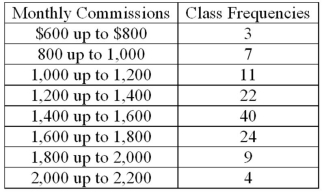 What is the relative frequency for those salespersons that earn from $1,600 up to $1,800?
What is the relative frequency for those salespersons that earn from $1,600 up to $1,800?
A) .02
B) .024
C) .20
D) .24
 What is the relative frequency for those salespersons that earn from $1,600 up to $1,800?
What is the relative frequency for those salespersons that earn from $1,600 up to $1,800?A) .02
B) .024
C) .20
D) .24

Unlock Deck
Unlock for access to all 132 flashcards in this deck.
Unlock Deck
k this deck
23
In a frequency distribution, the number of observations in a class is called the class ________.
A) Midpoint
B) Interval
C) Array
D) Frequency
A) Midpoint
B) Interval
C) Array
D) Frequency

Unlock Deck
Unlock for access to all 132 flashcards in this deck.
Unlock Deck
k this deck
24
A group of 100 students was surveyed about their interest in a new International Studies program. Interest was measured in terms of high, medium, or low. In the study, 30 students responded high interest, 40 students responded medium interest, and 30 students responded low interest. What is the relative frequency of students with high interest?
A) .30
B) .50
C) .40
D) .030
A) .30
B) .50
C) .40
D) .030

Unlock Deck
Unlock for access to all 132 flashcards in this deck.
Unlock Deck
k this deck
25
A sample distribution of hourly earnings in Paul's Cookie Factory is:  The limits of the class with the smallest frequency are:
The limits of the class with the smallest frequency are:
A) $6.00 and $9.00
B) $12.00 and up to $14.00
C) $11.75 and $14.25
D) $12.00 and up to $15.00
 The limits of the class with the smallest frequency are:
The limits of the class with the smallest frequency are:A) $6.00 and $9.00
B) $12.00 and up to $14.00
C) $11.75 and $14.25
D) $12.00 and up to $15.00

Unlock Deck
Unlock for access to all 132 flashcards in this deck.
Unlock Deck
k this deck
26
A student was interested in the cigarette smoking habits of college students and collected data from an unbiased random sample of students. The data is summarized in the following table: 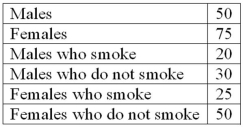 Why is the table NOT a frequency distribution?
Why is the table NOT a frequency distribution?
A) The number of males does not equal the sum of males that smoke and do not smoke.
B) The classes are not mutually exclusive.
C) There are too many classes.
D) Class limits cannot be computeD.
 Why is the table NOT a frequency distribution?
Why is the table NOT a frequency distribution?A) The number of males does not equal the sum of males that smoke and do not smoke.
B) The classes are not mutually exclusive.
C) There are too many classes.
D) Class limits cannot be computeD.

Unlock Deck
Unlock for access to all 132 flashcards in this deck.
Unlock Deck
k this deck
27
For a relative frequency distribution, relative frequency is computed as _____________.
A) The class width divided by the class interval
B) The class midpoint divided by the class frequency
C) The class frequency divided by the class interval
D) The class frequency divided by the total frequency
A) The class width divided by the class interval
B) The class midpoint divided by the class frequency
C) The class frequency divided by the class interval
D) The class frequency divided by the total frequency

Unlock Deck
Unlock for access to all 132 flashcards in this deck.
Unlock Deck
k this deck
28
For the following distribution of heights, what are the limits for the class with the greatest frequency? 
A) 64 and up to 70
B) 65 and 69
C) 65 and up to 70
D) 69.5 and 74.5

A) 64 and up to 70
B) 65 and 69
C) 65 and up to 70
D) 69.5 and 74.5

Unlock Deck
Unlock for access to all 132 flashcards in this deck.
Unlock Deck
k this deck
29
The number of employees less than the upper limit of each class at Lloyd's Fast Food Emporium is shown in the following table: 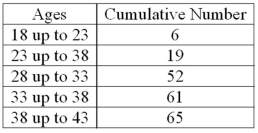 What is it called?
What is it called?
A) A histogram
B) A cumulative frequency table
C) A pie chart
D) A frequency polygon
 What is it called?
What is it called?A) A histogram
B) A cumulative frequency table
C) A pie chart
D) A frequency polygon

Unlock Deck
Unlock for access to all 132 flashcards in this deck.
Unlock Deck
k this deck
30
What is the following table called? 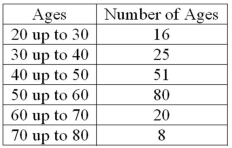
A) Histogram
B) Frequency polygon
C) Cumulative frequency distribution
D) Frequency distribution

A) Histogram
B) Frequency polygon
C) Cumulative frequency distribution
D) Frequency distribution

Unlock Deck
Unlock for access to all 132 flashcards in this deck.
Unlock Deck
k this deck
31
A student was interested in the cigarette smoking habits of college students and collected data from an unbiased random sample of students. The data is summarized in the following table:  What type of chart best represents the frequency table?
What type of chart best represents the frequency table?
A) Bar chart
B) Box plot
C) Scatter plot
D) Frequency polygon
 What type of chart best represents the frequency table?
What type of chart best represents the frequency table?A) Bar chart
B) Box plot
C) Scatter plot
D) Frequency polygon

Unlock Deck
Unlock for access to all 132 flashcards in this deck.
Unlock Deck
k this deck
32
A student was interested in the cigarette smoking habits of college students and collected data from an unbiased random sample of students. The data is summarized in the following table:  What type of chart best represents relative class frequencies?
What type of chart best represents relative class frequencies?
A) Box plot
B) Pie chart
C) Scatter plot
D) Frequency polygon
 What type of chart best represents relative class frequencies?
What type of chart best represents relative class frequencies?A) Box plot
B) Pie chart
C) Scatter plot
D) Frequency polygon

Unlock Deck
Unlock for access to all 132 flashcards in this deck.
Unlock Deck
k this deck
33
A student was studying the political party preferences of a university's student population. The survey instrument asked students to identify their political preference-for example, Democrat, Republican, Libertarian, or another party. The best way to illustrate the relative frequency distribution is a __________.
A) Bar chart
B) Pie chart
C) Histogram
D) Frequency polygon
A) Bar chart
B) Pie chart
C) Histogram
D) Frequency polygon

Unlock Deck
Unlock for access to all 132 flashcards in this deck.
Unlock Deck
k this deck
34
A group of 100 students were surveyed about their interest in a new Economics major. Interest was measured in terms of high, medium, or low. In the study, 30 students responded high interest, 50 students responded medium interest, and 20 students responded low interest. What is the best way to illustrate the relative frequency of student interest?
A) Use a cumulative frequency polygon
B) Use a box plot
C) Use a pie chart
D) Use a frequency table
A) Use a cumulative frequency polygon
B) Use a box plot
C) Use a pie chart
D) Use a frequency table

Unlock Deck
Unlock for access to all 132 flashcards in this deck.
Unlock Deck
k this deck
35
Why are unequal class intervals sometimes used in a frequency distribution?
A) To avoid a large number of empty classes
B) For the sake of variety in presenting the data
C) To make the class frequencies smaller
D) To avoid the need for midpoints
A) To avoid a large number of empty classes
B) For the sake of variety in presenting the data
C) To make the class frequencies smaller
D) To avoid the need for midpoints

Unlock Deck
Unlock for access to all 132 flashcards in this deck.
Unlock Deck
k this deck
36
A student was studying the political party preferences of a university's student population. The survey instrument asked students to identify themselves as a Democrat or a Republican. This question is flawed because:
A) Students generally don't know their political preferences.
B) The categories are generally mutually exclusive.
C) The categories are not exhaustive.
D) Political preference is a continuous variable.
A) Students generally don't know their political preferences.
B) The categories are generally mutually exclusive.
C) The categories are not exhaustive.
D) Political preference is a continuous variable.

Unlock Deck
Unlock for access to all 132 flashcards in this deck.
Unlock Deck
k this deck
37
The relative frequency for a class represents the ________________.
A) Class width
B) Class midpoint
C) Class interval
D) Percent of observations in the class
A) Class width
B) Class midpoint
C) Class interval
D) Percent of observations in the class

Unlock Deck
Unlock for access to all 132 flashcards in this deck.
Unlock Deck
k this deck
38
Refer to the following distribution of commissions: 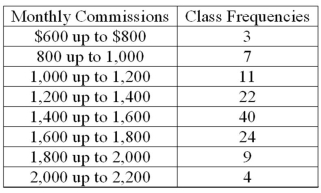 To plot a cumulative frequency distribution, the first coordinate would be _________.
To plot a cumulative frequency distribution, the first coordinate would be _________.
A) X = 0, Y = 600
B) X = 500, Y = 3
C) X = 3, Y = 600
D) X = 600, Y = 0
 To plot a cumulative frequency distribution, the first coordinate would be _________.
To plot a cumulative frequency distribution, the first coordinate would be _________.A) X = 0, Y = 600
B) X = 500, Y = 3
C) X = 3, Y = 600
D) X = 600, Y = 0

Unlock Deck
Unlock for access to all 132 flashcards in this deck.
Unlock Deck
k this deck
39
When a class interval is expressed as 100 up to 200, _________________________.
A) Observations with values of 100 are excluded from the class
B) Observations with values of 200 are included in the class
C) Observations with values of 200 are excluded from the class
D) The class interval is 99
A) Observations with values of 100 are excluded from the class
B) Observations with values of 200 are included in the class
C) Observations with values of 200 are excluded from the class
D) The class interval is 99

Unlock Deck
Unlock for access to all 132 flashcards in this deck.
Unlock Deck
k this deck
40
A student was studying the political party preferences of a university's student population. The survey instrument asked students to identify their political preference, for example, Democrat, Republican, Libertarian, or another party. The best way to illustrate the frequencies for each political preference is a __________.
A) Bar chart
B) Box plot
C) Histogram
D) Frequency polygon
A) Bar chart
B) Box plot
C) Histogram
D) Frequency polygon

Unlock Deck
Unlock for access to all 132 flashcards in this deck.
Unlock Deck
k this deck
41
Refer to the following distribution: 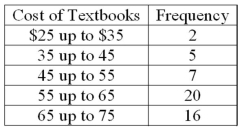 What is the class midpoint for the $45 up to $55 class?
What is the class midpoint for the $45 up to $55 class?
A) 49
B) 49.5
C) 50
D) 50.5
 What is the class midpoint for the $45 up to $55 class?
What is the class midpoint for the $45 up to $55 class?A) 49
B) 49.5
C) 50
D) 50.5

Unlock Deck
Unlock for access to all 132 flashcards in this deck.
Unlock Deck
k this deck
42
Refer to the following distribution of ages:  For the distribution of ages just shown, what is the relative class frequency for the lowest class?
For the distribution of ages just shown, what is the relative class frequency for the lowest class?
A) .50
B) .18
C) .20
D) .10
 For the distribution of ages just shown, what is the relative class frequency for the lowest class?
For the distribution of ages just shown, what is the relative class frequency for the lowest class?A) .50
B) .18
C) .20
D) .10

Unlock Deck
Unlock for access to all 132 flashcards in this deck.
Unlock Deck
k this deck
43
Refer to the following distribution: 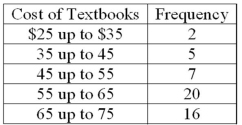 What is the relative class frequency for the $25 up to $35 class?
What is the relative class frequency for the $25 up to $35 class?
A) .02
B) .04
C) .05
D) .10
 What is the relative class frequency for the $25 up to $35 class?
What is the relative class frequency for the $25 up to $35 class?A) .02
B) .04
C) .05
D) .10

Unlock Deck
Unlock for access to all 132 flashcards in this deck.
Unlock Deck
k this deck
44
Refer to the following breakdown of responses to a survey of room service in a hotel.  What is the class interval for the frequency table above?
What is the class interval for the frequency table above?
A) 10
B) 20
C) 40
D) None Apply
 What is the class interval for the frequency table above?
What is the class interval for the frequency table above?A) 10
B) 20
C) 40
D) None Apply

Unlock Deck
Unlock for access to all 132 flashcards in this deck.
Unlock Deck
k this deck
45
Refer to the following wage breakdown for a garment factory. 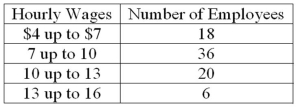 What are the class limits for the class with the smallest frequencies?
What are the class limits for the class with the smallest frequencies?
A) 3.5 and 6.5
B) 4 and up to 7
C) 13 and up to 16
D) 12.5 and 15.5
 What are the class limits for the class with the smallest frequencies?
What are the class limits for the class with the smallest frequencies?A) 3.5 and 6.5
B) 4 and up to 7
C) 13 and up to 16
D) 12.5 and 15.5

Unlock Deck
Unlock for access to all 132 flashcards in this deck.
Unlock Deck
k this deck
46
Refer to the following distribution of ages:  What is the class midpoint of the highest class?
What is the class midpoint of the highest class?
A) 54
B) 55
C) 64
D) 65
 What is the class midpoint of the highest class?
What is the class midpoint of the highest class?A) 54
B) 55
C) 64
D) 65

Unlock Deck
Unlock for access to all 132 flashcards in this deck.
Unlock Deck
k this deck
47
Refer to the following distribution of commissions: 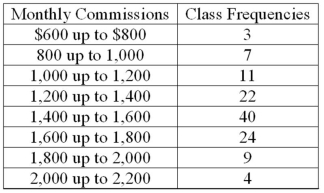 What is the class interval?
What is the class interval?
A) 200
B) 300
C) 3,500
D) 400
 What is the class interval?
What is the class interval?A) 200
B) 300
C) 3,500
D) 400

Unlock Deck
Unlock for access to all 132 flashcards in this deck.
Unlock Deck
k this deck
48
Refer to the following wage breakdown for a garment factory. 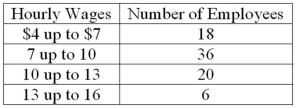 What is the class midpoint for the class with the greatest frequency?
What is the class midpoint for the class with the greatest frequency?
A) $5.50
B) $8.50
C) $11.50
D) $14.50
 What is the class midpoint for the class with the greatest frequency?
What is the class midpoint for the class with the greatest frequency?A) $5.50
B) $8.50
C) $11.50
D) $14.50

Unlock Deck
Unlock for access to all 132 flashcards in this deck.
Unlock Deck
k this deck
49
Refer to the following distribution: 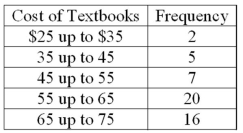 What are the class limits for the class with the highest frequency?
What are the class limits for the class with the highest frequency?
A) 55 up to 64
B) 54 up to 64
C) 55 up to 65
D) 55 up to 64.5
 What are the class limits for the class with the highest frequency?
What are the class limits for the class with the highest frequency?A) 55 up to 64
B) 54 up to 64
C) 55 up to 65
D) 55 up to 64.5

Unlock Deck
Unlock for access to all 132 flashcards in this deck.
Unlock Deck
k this deck
50
Refer to the following distribution of ages:  What is the class interval?
What is the class interval?
A) 9
B) 10
C) 10.5
D) 11
 What is the class interval?
What is the class interval?A) 9
B) 10
C) 10.5
D) 11

Unlock Deck
Unlock for access to all 132 flashcards in this deck.
Unlock Deck
k this deck
51
Refer to the following distribution of commissions: 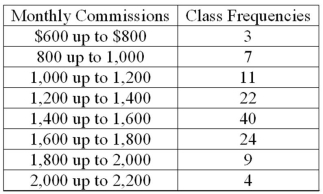 For the preceding distribution, what is the midpoint of the class with the greatest frequency?
For the preceding distribution, what is the midpoint of the class with the greatest frequency?
A) 1,400
B) 1,500
C) 1,700
D) The midpoint cannot be determineD.
 For the preceding distribution, what is the midpoint of the class with the greatest frequency?
For the preceding distribution, what is the midpoint of the class with the greatest frequency?A) 1,400
B) 1,500
C) 1,700
D) The midpoint cannot be determineD.

Unlock Deck
Unlock for access to all 132 flashcards in this deck.
Unlock Deck
k this deck
52
Refer to the following frequency distribution on days absent during a calendar year by employees of a manufacturing company: 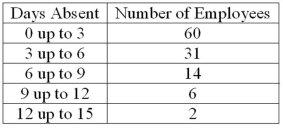 How many employees were absent from 6 up to 12 days?
How many employees were absent from 6 up to 12 days?
A) 20
B) 8
C) 12
D) 17
 How many employees were absent from 6 up to 12 days?
How many employees were absent from 6 up to 12 days?A) 20
B) 8
C) 12
D) 17

Unlock Deck
Unlock for access to all 132 flashcards in this deck.
Unlock Deck
k this deck
53
Refer to the following frequency distribution on days absent during a calendar year by employees of a manufacturing company: 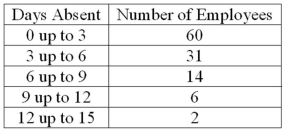 How many employees were absent for between 3 up to 6 days?
How many employees were absent for between 3 up to 6 days?
A) 31
B) 29
C) 14
D) 2
 How many employees were absent for between 3 up to 6 days?
How many employees were absent for between 3 up to 6 days?A) 31
B) 29
C) 14
D) 2

Unlock Deck
Unlock for access to all 132 flashcards in this deck.
Unlock Deck
k this deck
54
Refer to the following information from a frequency distribution for "heights of college women" recorded to the nearest inch: the first two class midpoints are 62.5" and 65.5". What are the class limits for the third class?
A) 64 and up to 67
B) 67 and 69
C) 67 and up to 70
D) 66 and 68
A) 64 and up to 67
B) 67 and 69
C) 67 and up to 70
D) 66 and 68

Unlock Deck
Unlock for access to all 132 flashcards in this deck.
Unlock Deck
k this deck
55
Refer to the following information from a frequency distribution for "heights of college women" recorded to the nearest inch: the first two class midpoints are 62.5" and 65.5". What is the class interval?
A) 1"
B) 2"
C) 2.5"
D) 3"
A) 1"
B) 2"
C) 2.5"
D) 3"

Unlock Deck
Unlock for access to all 132 flashcards in this deck.
Unlock Deck
k this deck
56
Refer to the following frequency distribution on days absent during a calendar year by employees of a manufacturing company: 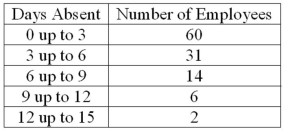 How many employees were absent fewer than six days?
How many employees were absent fewer than six days?
A) 60
B) 31
C) 91
D) 46
 How many employees were absent fewer than six days?
How many employees were absent fewer than six days?A) 60
B) 31
C) 91
D) 46

Unlock Deck
Unlock for access to all 132 flashcards in this deck.
Unlock Deck
k this deck
57
Refer to the following frequency distribution on days absent during a calendar year by employees of a manufacturing company: 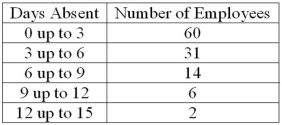 How many employees were absent six days or more?
How many employees were absent six days or more?
A) 8
B) 4
C) 22
D) 31
 How many employees were absent six days or more?
How many employees were absent six days or more?A) 8
B) 4
C) 22
D) 31

Unlock Deck
Unlock for access to all 132 flashcards in this deck.
Unlock Deck
k this deck
58
Refer to the following wage breakdown for a garment factory. 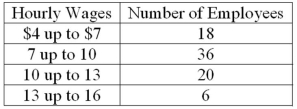 What is the class interval for the preceding table of wages?
What is the class interval for the preceding table of wages?
A) $2
B) $3
C) $4
D) $5
 What is the class interval for the preceding table of wages?
What is the class interval for the preceding table of wages?A) $2
B) $3
C) $4
D) $5

Unlock Deck
Unlock for access to all 132 flashcards in this deck.
Unlock Deck
k this deck
59
Refer to the following distribution of commissions: 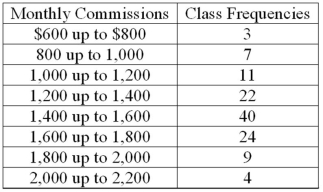 What is the relative frequency of those salespersons that earn $1,600 or more?
What is the relative frequency of those salespersons that earn $1,600 or more?
A) 25.5%
B) 27.5%
C) 29.5%
D) 30.8%
 What is the relative frequency of those salespersons that earn $1,600 or more?
What is the relative frequency of those salespersons that earn $1,600 or more?A) 25.5%
B) 27.5%
C) 29.5%
D) 30.8%

Unlock Deck
Unlock for access to all 132 flashcards in this deck.
Unlock Deck
k this deck
60
Refer to the following information from a frequency distribution for "heights of college women" recorded to the nearest inch: the first two class midpoints are 62.5" and 65.5". What are the class limits for the lowest class?
A) 61 and up to 64
B) 62 and up to 64
C) 62 and 65
D) 62 and 63
A) 61 and up to 64
B) 62 and up to 64
C) 62 and 65
D) 62 and 63

Unlock Deck
Unlock for access to all 132 flashcards in this deck.
Unlock Deck
k this deck
61
Refer to the following breakdown of responses to a survey of "Are you concerned about being tracked while connected to the Internet?"  What percent of the responses indicated that users were somewhat concerned?
What percent of the responses indicated that users were somewhat concerned?
A) 40%
B) 70%
C) 20%
D) 100%
 What percent of the responses indicated that users were somewhat concerned?
What percent of the responses indicated that users were somewhat concerned?A) 40%
B) 70%
C) 20%
D) 100%

Unlock Deck
Unlock for access to all 132 flashcards in this deck.
Unlock Deck
k this deck
62
In order to convert class frequency to relative class frequency, we
A) divide the midpoint of the class by the sample size.
B) divide the frequency of the class by the midpoint.
C) divide the sample size by the frequency of the class.
D) divide the frequency of the class by the sample size.
A) divide the midpoint of the class by the sample size.
B) divide the frequency of the class by the midpoint.
C) divide the sample size by the frequency of the class.
D) divide the frequency of the class by the sample size.

Unlock Deck
Unlock for access to all 132 flashcards in this deck.
Unlock Deck
k this deck
63
Refer to the following breakdown of responses to a survey of "How confident are you that you saved enough to retire?" 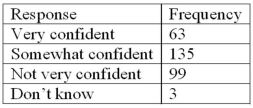 What percent of the responses indicated that users were very confident?
What percent of the responses indicated that users were very confident?
A) 63%
B) 21%
C) 45%
D) 33%
 What percent of the responses indicated that users were very confident?
What percent of the responses indicated that users were very confident?A) 63%
B) 21%
C) 45%
D) 33%

Unlock Deck
Unlock for access to all 132 flashcards in this deck.
Unlock Deck
k this deck
64
Refer to the following breakdown of responses to a survey of "Are you concerned about being tracked while connected to the Internet?"  What type of chart should be used to show relative class frequencies?
What type of chart should be used to show relative class frequencies?
A) A pie chart
B) A bar chart
C) A histogram
D) A frequency polygon
 What type of chart should be used to show relative class frequencies?
What type of chart should be used to show relative class frequencies?A) A pie chart
B) A bar chart
C) A histogram
D) A frequency polygon

Unlock Deck
Unlock for access to all 132 flashcards in this deck.
Unlock Deck
k this deck
65
Refer to the following breakdown of responses to a survey of "Are you concerned about being tracked while connected to the Internet?"  What type of chart should be used to describe the frequency table?
What type of chart should be used to describe the frequency table?
A) A pie chart
B) A bar chart
C) A histogram
D) A frequency polygon
 What type of chart should be used to describe the frequency table?
What type of chart should be used to describe the frequency table?A) A pie chart
B) A bar chart
C) A histogram
D) A frequency polygon

Unlock Deck
Unlock for access to all 132 flashcards in this deck.
Unlock Deck
k this deck
66
In constructing a frequency polygon, class frequencies are scaled on the ______ axis.

Unlock Deck
Unlock for access to all 132 flashcards in this deck.
Unlock Deck
k this deck
67
A pie chart shows the ______________________.
A) Relative frequencies of a qualitative variable
B) Relative frequencies of a quantitative variable
C) Frequencies of a nominal variable
D) Frequencies of a ratio variable
A) Relative frequencies of a qualitative variable
B) Relative frequencies of a quantitative variable
C) Frequencies of a nominal variable
D) Frequencies of a ratio variable

Unlock Deck
Unlock for access to all 132 flashcards in this deck.
Unlock Deck
k this deck
68
Refer to the following breakdown of responses to a survey of room service in a hotel.  What type of chart should be used to describe the frequency table?
What type of chart should be used to describe the frequency table?
A) A pie chart
B) A bar chart
C) A histogram
D) A frequency polygon
 What type of chart should be used to describe the frequency table?
What type of chart should be used to describe the frequency table?A) A pie chart
B) A bar chart
C) A histogram
D) A frequency polygon

Unlock Deck
Unlock for access to all 132 flashcards in this deck.
Unlock Deck
k this deck
69
Refer to the following breakdown of responses to a survey of room service in a hotel.  What is the class with the greatest frequency?
What is the class with the greatest frequency?
A) Not satisfied
B) Satisfied
C) Highly satisfied
D) None Apply
 What is the class with the greatest frequency?
What is the class with the greatest frequency?A) Not satisfied
B) Satisfied
C) Highly satisfied
D) None Apply

Unlock Deck
Unlock for access to all 132 flashcards in this deck.
Unlock Deck
k this deck
70
A frequency distribution for nominal data requires that the categories be ___________________ and _____________________.

Unlock Deck
Unlock for access to all 132 flashcards in this deck.
Unlock Deck
k this deck
71
Refer to the following breakdown of responses to a survey of "How confident are you that you saved enough to retire?" 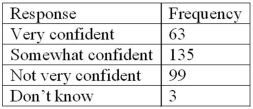 What type of chart should be used to show relative class frequencies?
What type of chart should be used to show relative class frequencies?
A) A pie chart
B) A bar chart
C) A histogram
D) A frequency polygon
 What type of chart should be used to show relative class frequencies?
What type of chart should be used to show relative class frequencies?A) A pie chart
B) A bar chart
C) A histogram
D) A frequency polygon

Unlock Deck
Unlock for access to all 132 flashcards in this deck.
Unlock Deck
k this deck
72
A table summarizing a set of data showing the fraction of the total number of items in several classes is a
A) relative frequency distribution.
B) frequency distribution.
C) normal frequency distribution.
D) cumulative frequency distribution.
A) relative frequency distribution.
B) frequency distribution.
C) normal frequency distribution.
D) cumulative frequency distribution.

Unlock Deck
Unlock for access to all 132 flashcards in this deck.
Unlock Deck
k this deck
73
Refer to the following breakdown of responses to a survey of room service in a hotel.  What percent of the responses indicated that customers were satisfied?
What percent of the responses indicated that customers were satisfied?
A) 40%
B) 33%
C) 50%
D) 100%
 What percent of the responses indicated that customers were satisfied?
What percent of the responses indicated that customers were satisfied?A) 40%
B) 33%
C) 50%
D) 100%

Unlock Deck
Unlock for access to all 132 flashcards in this deck.
Unlock Deck
k this deck
74
Refer to the following breakdown of responses to a survey of "Are you concerned about being tracked while connected to the Internet?"  What is the class with the greatest frequency?
What is the class with the greatest frequency?
A) Very concerned
B) Somewhat concerned
C) No concern
D) None Apply
 What is the class with the greatest frequency?
What is the class with the greatest frequency?A) Very concerned
B) Somewhat concerned
C) No concern
D) None Apply

Unlock Deck
Unlock for access to all 132 flashcards in this deck.
Unlock Deck
k this deck
75
Refer to the following breakdown of responses to a survey of "How confident are you that you saved enough to retire?" 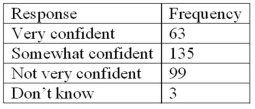 What is the class interval for the preceding frequency table?
What is the class interval for the preceding frequency table?
A) 10
B) 20
C) 40
D) None Apply
 What is the class interval for the preceding frequency table?
What is the class interval for the preceding frequency table?A) 10
B) 20
C) 40
D) None Apply

Unlock Deck
Unlock for access to all 132 flashcards in this deck.
Unlock Deck
k this deck
76
Refer to the following breakdown of responses to a survey of "How confident are you that you saved enough to retire?" 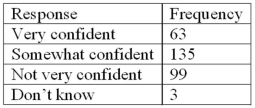 What is the class with the greatest frequency?
What is the class with the greatest frequency?
A) Very confident
B) Somewhat confident
C) Not very confident
D) Don't know
 What is the class with the greatest frequency?
What is the class with the greatest frequency?A) Very confident
B) Somewhat confident
C) Not very confident
D) Don't know

Unlock Deck
Unlock for access to all 132 flashcards in this deck.
Unlock Deck
k this deck
77
Refer to the following breakdown of responses to a survey of room service in a hotel.  What type of chart should be used to show relative class frequencies?
What type of chart should be used to show relative class frequencies?
A) A pie chart
B) A bar chart
C) A histogram
D) A frequency polygon
 What type of chart should be used to show relative class frequencies?
What type of chart should be used to show relative class frequencies?A) A pie chart
B) A bar chart
C) A histogram
D) A frequency polygon

Unlock Deck
Unlock for access to all 132 flashcards in this deck.
Unlock Deck
k this deck
78
In constructing a frequency distribution, the approximate class width is computed as
A) (maximum value - minimum value)/(number of classes)
B) (maximum value - minimum value)/(sample size)
C) (minimum value - maximum value)/(sample size)
D) (maximum value)/(number of classes - sample size)
A) (maximum value - minimum value)/(number of classes)
B) (maximum value - minimum value)/(sample size)
C) (minimum value - maximum value)/(sample size)
D) (maximum value)/(number of classes - sample size)

Unlock Deck
Unlock for access to all 132 flashcards in this deck.
Unlock Deck
k this deck
79
Refer to the following breakdown of responses to a survey of "How confident are you that you saved enough to retire?" 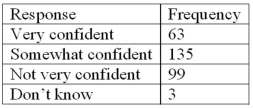 What type of chart should be used to describe the frequency table?
What type of chart should be used to describe the frequency table?
A) A pie chart
B) A bar chart
C) A histogram
D) A frequency polygon
 What type of chart should be used to describe the frequency table?
What type of chart should be used to describe the frequency table?A) A pie chart
B) A bar chart
C) A histogram
D) A frequency polygon

Unlock Deck
Unlock for access to all 132 flashcards in this deck.
Unlock Deck
k this deck
80
Refer to the following breakdown of responses to a survey of "Are you concerned about being tracked while connected to the Internet?"  What is the class interval for the preceding frequency table?
What is the class interval for the preceding frequency table?
A) 10
B) 20
C) 40
D) None Apply
 What is the class interval for the preceding frequency table?
What is the class interval for the preceding frequency table?A) 10
B) 20
C) 40
D) None Apply

Unlock Deck
Unlock for access to all 132 flashcards in this deck.
Unlock Deck
k this deck


